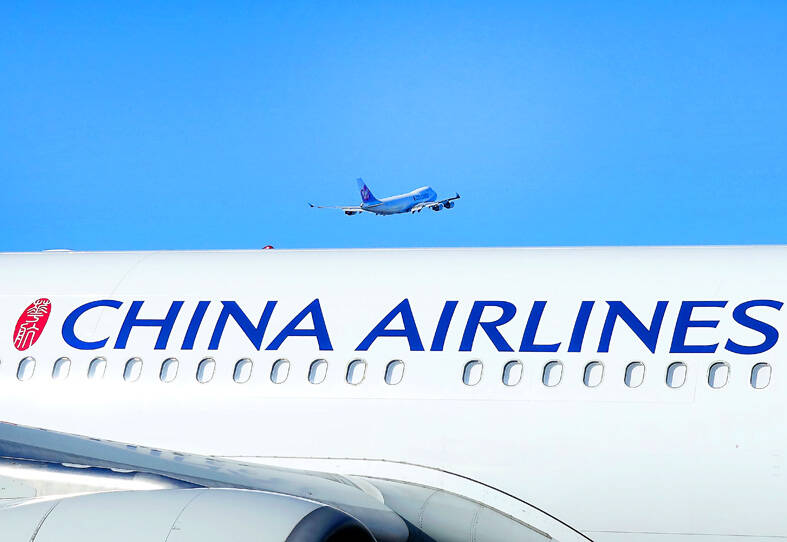China Airlines Ltd’s (CAL, 中華航空) board of directors yesterday approved a plan to spend up to US$4.6 billion to purchase 16 Boeing Co 787-9 airplanes, with delivery scheduled to start in 2025.
The airline expects to receive all 16 new planes by the end of 2027, it said.
As the new planes arrive, the company would at the same time retire its older Airbus SE 330-300 aircraft for medium-haul services.

Photo: Chu Pei-hsiung, Taipei Times
The new wide-body Boeing aircraft equipped with General Electric Co’s next-generation engines would be used mainly for regional routes, such as flights between Taiwan and Australia, as well as New Zealand, CAL said.
Asked why it did not opt for a similar wide-body plane such as the Airbus 330neo, CAL said that its primary concerns were fuel efficiency, maintenance costs and cargo capacity, as well as jet design and market acceptance.
In particular, in light of the COVID-19 pandemic, CAL needs to make allowances for a new business model in which a passenger jet might also be utilized for air cargo business, it said, adding that the cabin of a 787-9 jet can accommodate 36 containers, much more than other wide-body aircraft.
The addition of the Boeing 787-9 planes would boost CAL’s cargo capacity, the airline said.
“Overall, our purchase task force gave Boeing 787-9 passenger jets the highest score among all wide-body aircraft, believing that the airplane would have the best utility,” the airline said.
CAL in September last year set up the task force responsible for determining the purchase of new aircraft and recently finalized its conclusion, the airline said.
The 787-9 aircraft’s fuel consumption and carbon emissions are 20 percent lower than that of older passenger jets, which would help the airline reach its goal of net zero carbon emissions by 2050, it said.
The deal includes eight options allowing CAL to buy the bigger 787-10 aircraft if necessary, it said.
CAL has 65 passenger jets and 21 cargo jets.
CAL would be the second Taiwanese airline to purchase Boeing’s 787-9 aircraft, after EVA Airways Corp (長榮航空) in 2018.

The New Taiwan dollar is on the verge of overtaking the yuan as Asia’s best carry-trade target given its lower risk of interest-rate and currency volatility. A strategy of borrowing the New Taiwan dollar to invest in higher-yielding alternatives has generated the second-highest return over the past month among Asian currencies behind the yuan, based on the Sharpe ratio that measures risk-adjusted relative returns. The New Taiwan dollar may soon replace its Chinese peer as the region’s favored carry trade tool, analysts say, citing Beijing’s efforts to support the yuan that can create wild swings in borrowing costs. In contrast,

Nvidia Corp’s demand for advanced packaging from Taiwan Semiconductor Manufacturing Co (TSMC, 台積電) remains strong though the kind of technology it needs is changing, Nvidia CEO Jensen Huang (黃仁勳) said yesterday, after he was asked whether the company was cutting orders. Nvidia’s most advanced artificial intelligence (AI) chip, Blackwell, consists of multiple chips glued together using a complex chip-on-wafer-on-substrate (CoWoS) advanced packaging technology offered by TSMC, Nvidia’s main contract chipmaker. “As we move into Blackwell, we will use largely CoWoS-L. Of course, we’re still manufacturing Hopper, and Hopper will use CowoS-S. We will also transition the CoWoS-S capacity to CoWos-L,” Huang said

VERTICAL INTEGRATION: The US fabless company’s acquisition of the data center manufacturer would not affect market competition, the Fair Trade Commission said The Fair Trade Commission has approved Advanced Micro Devices Inc’s (AMD) bid to fully acquire ZT International Group Inc for US$4.9 billion, saying it would not hamper market competition. As AMD is a fabless company that designs central processing units (CPUs) used in consumer electronics and servers, while ZT is a data center manufacturer, the vertical integration would not affect market competition, the commission said in a statement yesterday. ZT counts hyperscalers such as Microsoft Corp, Amazon.com Inc and Google among its major clients and plays a minor role in deciding the specifications of data centers, given the strong bargaining power of

Nvidia Corp CEO Jensen Huang (黃仁勳) is expected to miss the inauguration of US president-elect Donald Trump on Monday, bucking a trend among high-profile US technology leaders. Huang is visiting East Asia this week, as he typically does around the time of the Lunar New Year, a person familiar with the situation said. He has never previously attended a US presidential inauguration, said the person, who asked not to be identified, because the plans have not been announced. That makes Nvidia an exception among the most valuable technology companies, most of which are sending cofounders or CEOs to the event. That includes